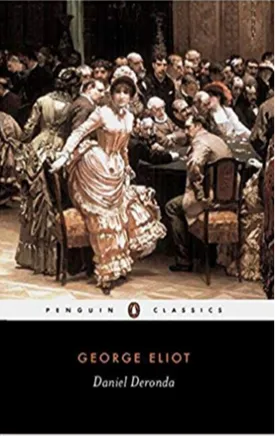George Eliot’s Daniel Deronda is a sweeping novel that not only chronicles the lives of two main characters—Daniel Deronda and Gwendolen Harleth—but also touches on hot-button topics such as anti-Semitism and feminism in the late 19th century. Written between 1874 and 1876, Eliot’s penultimate novel reflects her own beliefs and values as a humanist and champion of progressivism.
Daniel Deronda begins with the mysterious young man, Daniel Deronda, gambling in a casino and winning a considerable sum of money. Hans Meyrick, a benefactor of Daniel’s, finds the young man and reveals to him the truth of his identity—Daniel’s Jewish ancestry and faith. Daniel is informed that he is a part of a hidden Jewish lineage stretching as far back as the 16th century. Although this news elicits both excitement and guilt, Daniel is further confronted by questions concerning his heritage and how it relates to his life.
Meanwhile, we are introduced to Gwendolen Harleth, a young woman from a financially-strained family. After a series of negative decisions, Gwendolen sacrificially enters into a loveless marriage in order to bring some financial solvency to her family. After learning that her husband was dishonest about his financial standing, she escapes her marriage and it is here where she meets Daniel. Gwendolen begins to fall in love with Daniel, yet remains in a state of inner turmoil due to her newly discovered feelings.
As the story progresses, we learn that Daniel Deronda fully embraces his newfound Jewish identity and becomes an ardent supporter of Zionism. Daniel travels to the Holy Land in order to learn more about his heritage and help create a homeland for other persecuted Jews in the future.
At the same time, Gwendolen must choose between either continuing to preserve her reputation and social status, or kowtow to her honest feelings of love and follow Daniel to the Middle East. Eliot documents not only the hardships of Gwendolen’s station in life, but further illuminates some of the larger themes of her novel. Eliot’s characters must come to terms with their respective identities and backgrounds while they also grapple with the idea of self-sacrifice.
Eliot critiques anti-Semitism and other “isms” while also championing the concept of acceptance, love, and understanding. Her characters of all backgrounds strive to find their role in life and grapple between having practical aspirations and accomplishing goals with true passion and purpose.
Ultimately, Daniel Deronda is a work that speaks to hope and potential; hope for a better tomorrow and potential for an emancipation of sorts. Eliot’s characters should not be seen as a commentary on society as a whole, but instead as striving individuals who eventually journey to a place where truth triumphs and joy is restored.

